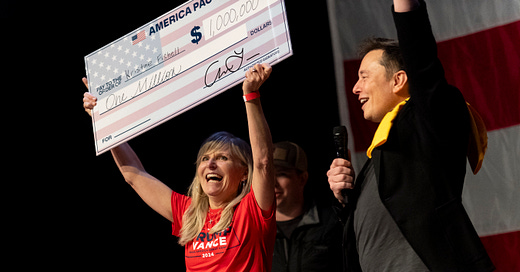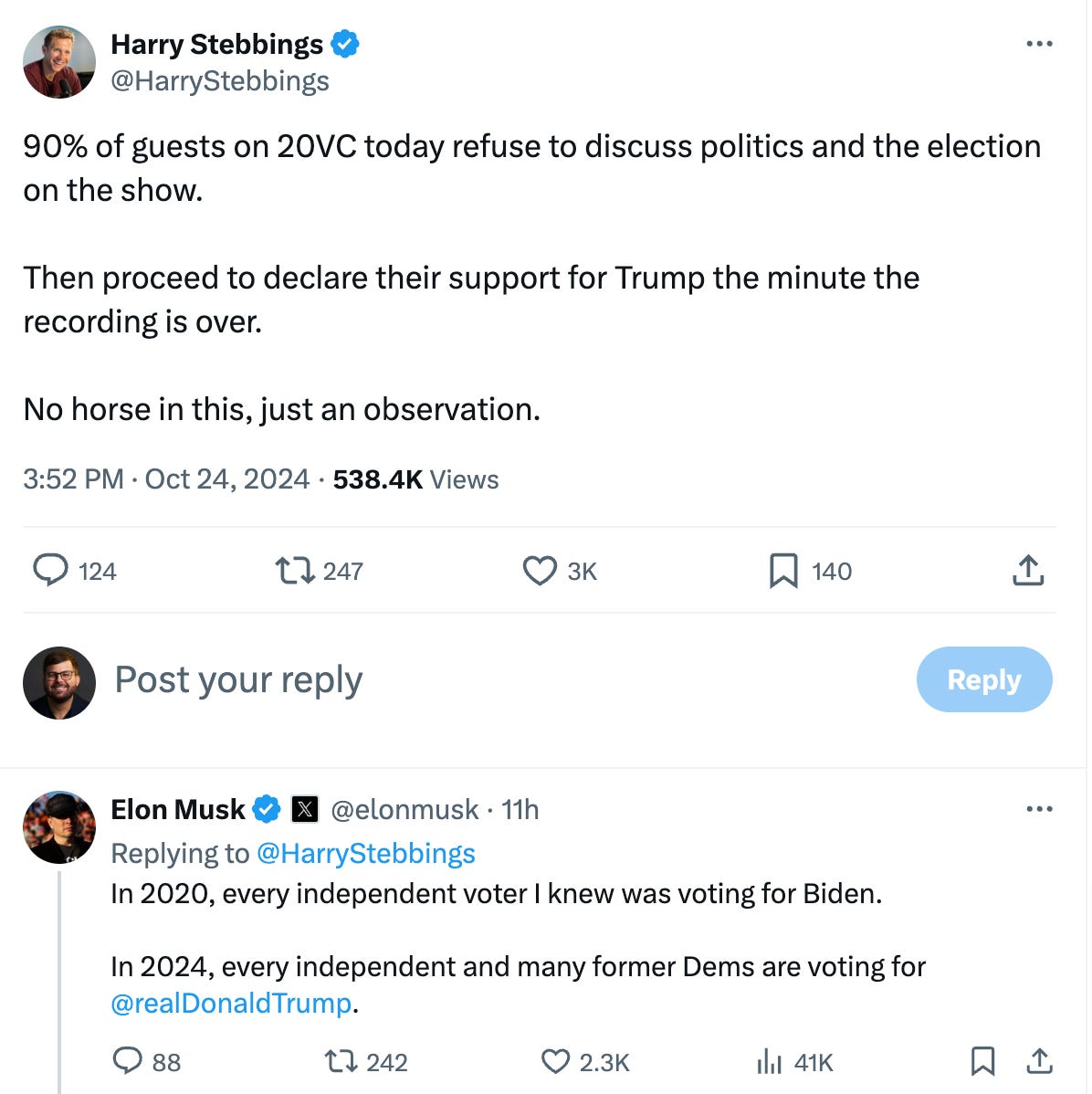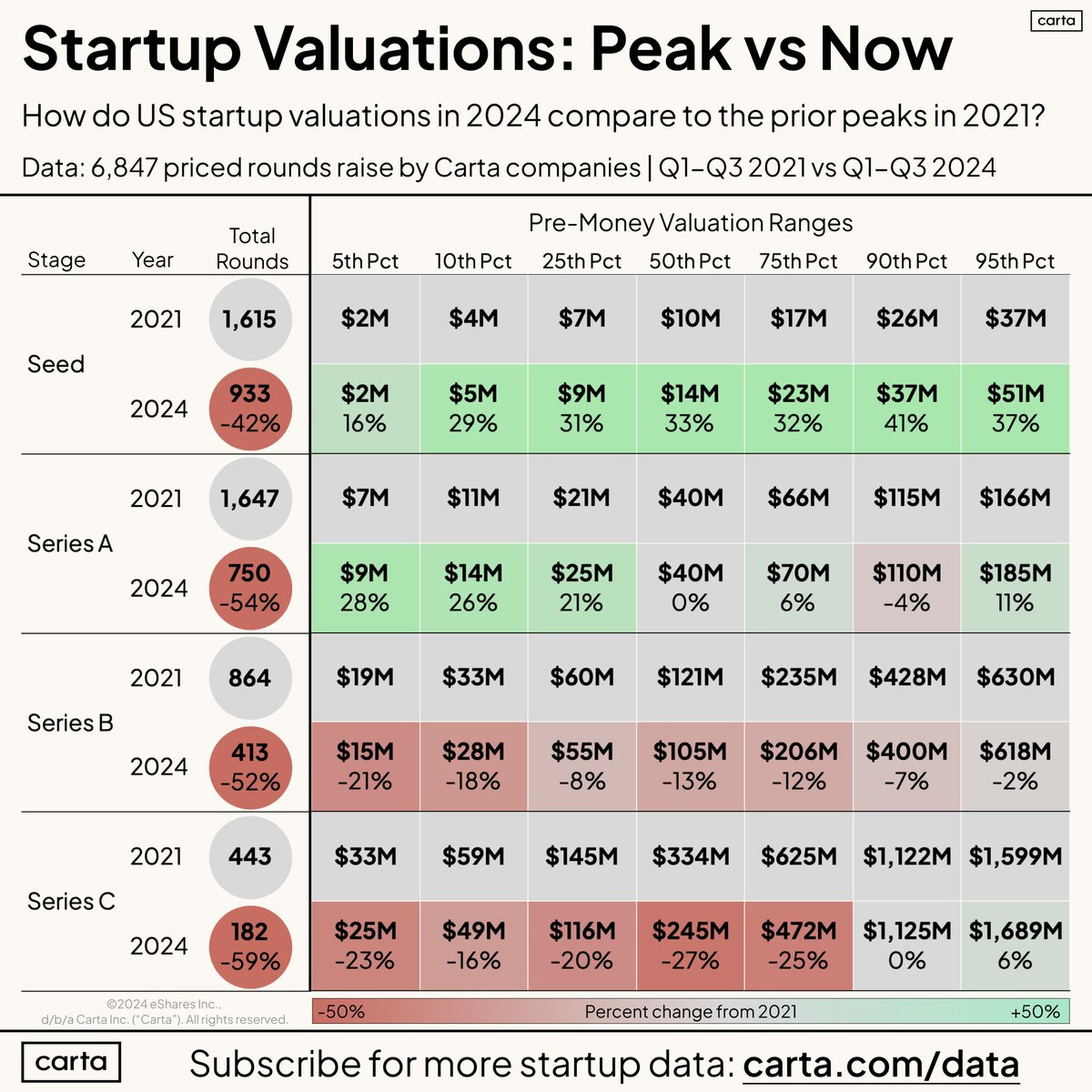Crypto, Antitrust and 'American Dynamism' on the Ballot
Plus, General Catalyst's $8 billion fundraising haul
The Main Item
VCs Are Like the Rest of Us: Divided by the Election
Silicon Valley financiers and entrepreneurs have long been a source of cash for national political candidates, but never before have big tech names been as involved–and as conflicted–about a presidential race.
The spectacle of the world’s richest man, Elon Musk, doling out cash as he stumps for Trump—election law be damned!—is certainly a first. So is the public angst of Ben Horowitz, who, after infuriating many friends by joining partner Marc Andreessen on the Trump train, announced that he and his wife would give a “significant” sum to the Harris campaign.
A cohort of VCs and founders animated by the idea that American technological excellence needs to be unleashed to bend geopolitics–Andreessen, Peter Thiel, Palmer Luckey, Shaun Maguire, and Joe Lonsdale among them—have leaned hard into the Trump campaign. So have others, like David Sacks, who seem animated by their contempt for left-wing wokeism.
The fence-sitters include Lux Capital’s Josh Wolfe, a longtime Democratic supporter, who posted on X this week that he will be writing in Mitt Romney’s name this year.
But most traditionally Democratic Silicon Valley VCs, led by Reid Hoffman, Ron Conway, and Vinod Khosla, are playing hard for team blue. Some of the largest donors to the “Tech for Campaigns” PAC, which is fundraising for Democrats across the US, include Conway, Sam Altman, and Y Combinator cofounder Jessica Livingston, who donated $5 million this September.
The tech rank-and-file remains true-blue as well, according to data from OpenSecrets.
We’re a long way from the moment in 2017 when the whole tech world seemed united in opposition to Trump’s racist immigration policies.
It’s no secret that we at Newcomer believe the former president is a threat to American democracy and the rule of law, and we’re puzzled that Trump’s intentions on things like making the Fed subservient to the White House aren’t more worrisome to his business supporters.
Whatever side you’re on, though, the ferocity of the new Silicon Valley divide makes it easy to overlook the fact that the tech policy differences are actually pretty narrow.
Thousands of enterprises rely on Oracle Cloud Infrastructure (OCI) to power the applications that drive their businesses across industries like healthcare, scientific research, financial services, telecommunications, and more.
Oracle offers integrated suites of applications plus secure, autonomous infrastructure in the Oracle Cloud.
Talk with Oracle today about accelerating your GPU workloads.
Crypto Wins Either Way
Crypto investors have spent big in the 2024 election cycle so far, contributing around half of the total corporate donations in the presidential race as of this summer.
Trump, once dismissive of crypto, has positioned himself as the industry’s candidate, favoring less regulation overall, and even promised that he’d force the Fed to buy up cryptocurrency reserves. Big crypto investors like a16z are very enthusiastic about this.
But the Harris campaign has been trying to break the perception that it’s not friendly to crypto, bringing in the US Treasury’s Brian Nelson and Louisa Terrell from the Biden Administration to work with crypto leaders on policy. Mark Cuban has also been in her ear about the issue, although neither he nor the campaign have called him an official advisor.
Conway broke from a major crypto PAC over its support for Trump-backed Senate candidates, arguing that the Democrats are coming around. SEC chairman Gary Gensler is a particular bogeyman for crypto investors, and the tea leaves suggest he might not be around for a Harris administration.
So no matter the outcome of the election, we expect policies to shift in favor of cryptocurrency trading and investing.
Antitrust & Tax Policy in the Balance
President Biden’s proposal to tax unrealized capital gains is unpopular across the board in techland: the advocacy group “VCs for Kamala,” whose over 850 signatories include Conway and Khosla as well, found that 75% of its members were in agreement with a statement that taxing unrealized capital gains would stifle innovation, and the betting here is that this idea will die a quiet death no matter who wins.
FTC chair Lina Khan’s future is another matter. She’s at the top of the bogeyman list for investors including Hoffman, who believe her crackdown on Big Tech is killing M&A and slowing innovation. Y-Combinator’s Garry Tan, on the other hand, supports Khan’s approach on the grounds that it’s good for “little tech.” (‘Little tech,’ unlike ‘big tech,’ is easy for everyone to love.) Whether Harris would ultimately stick with Khan is unclear.
Trump supporters assume he’d back off on antitrust enforcement, though that isn’t a given. He’s been quite hostile to big tech in the past, and his one-time VC running mate, JD Vance, has praised Khan.
More prosaically, the individual income tax cuts passed in the first Trump presidency would likely be extended if he wins, and allowed to expire if he loses. Trump wants further cuts in the corporate tax rate, while Harris proposes an increase.
Big AI Shows a Little Blue
OpenAI recently brought on former Al Gore and Obama staffer (and Airbnb executive) Chris Lehane to be head of policy, and this week hired a Chief Economist, Aaron “Ronnie” Chatterji, who served in both the Obama and Biden White House. Its CEO Altman has historically backed Democrats in races across the US.
Anthropic, meanwhile, came out in favor of a California AI regulation bill that was opposed by much of the industry and ultimately vetoed by Governor Gavin Newsom. Earlier this year it also released an internal policy around preventing election misinformation in its chatbots, which is generally an issue of concern to Democrats.
A Trump administration could be counted on for a light touch on AI regulation, while Harris would likely be more open to it—though she’s said little on the issue.
New Funds
General Catalyst Raises $8 Billion
Hemant Taneja’s company—and yes, he’s calling it a company these days, not a firm—is one of the new juggernauts ruling Silicon Valley investing, alongside the likes of Andreessen Horowitz and Lightspeed.
"We’ve made a transition from being a venture capital firm to being a global investment and transformation company," Taneja told us Thursday.
The company — which Taneja says has invested in Stripe 14 times since 2010 — has transcended pure venture capital.
But don’t call them a next-generation private equity firm either, Taneja said. General Catalyst is incubating new companies and fueling their growth, not slicing them up and cutting costs. “One of our values is playing our own game, running our own race,” Taneja said.
GC has bought a hospital, merged portfolio companies, and created a Customer Value Fund for startups to invest in growth.
Taneja says he’s not in the business of accumulating capital to collect management fees. But clearly the big Silicon Valley investment firms are creeping closer to the incentive structure of the private equity business where there’s lots of money to be made just by dint of managing a lot of money.
High-Profile Exits
VCs Score on Bridge Exit, Shein IPO Looking Less Shiny
Stripe confirmed its planned $1.1 billion acquisition of Bridge — a very welcome exit for VCs at a time when IPOs are scarce and M&A erratic. It’s the biggest crypto startup acquisition to date by a payments company, and a big endorsement of stablecoins for payment at a political moment when the crypto industry is especially eager to show its value.
The biggest winner on the Bridge deal is Sequoia, according to new details we’ve learned. Sequoia led the company’s Series A in December 2023 and remains the largest institutional investor in the company—and the only investor with a board seat, held by Shaun Maguire. Sequoia is also a longtime investor in Stripe as well.
It’s also good news for Index Ventures and Bedrock Capital, who each participated in an earlier seed round.
Bridge was initially valued at $100 million in its Series A, and Ribbit Capital led an extension round in early 2024. Bridge’s valuation increased again this summer to around $300 million during a final additional round before the acquisition, sources say.
Chris Ahn, who helped spearhead Index’s investment in Bridge, also invested in Bridge at Haun Ventures.
Bridge reportedly was doing around $12 million in ARR at the time of sale, putting the price at a whopping 90x revenue, although we hear that Bridge is growing rapidly.
IPO Troubles
Meanwhile, the IPO outlook remains bleak. Chinese ultra-fast fashion retailer Shein — one of the most valuable private companies alongside OpenAI and SpaceX — saw its growth slow to only 23% in the first half of this year, compared to 40% last year, as it faces stiff competition from Temu.
Shein had planned a U.S. IPO this year, but Senator Marco Rubio’s pressure on the SEC to block it led the company to relocate its debut to the London Stock Exchange. It’s planning to begin its investor roadshow soon, Reuters reported.
Chinese self-driving vehicle startup Pony.AI, by contrast, last week filed to go public on the New York Stock Exchange, projecting a minimum valuation of $4 billion. We’ll be curious to see if it can stay on track.
One Big Chart
Seed Valuations Defy Trends as Deal Count Slumps
Seed stage companies are proving more valuable than ever this year, but that’s the only bright spot in new data from Carta that shows big drops in later stage valuations and deal counts.
The number of funding rounds was down 54% for Series A, 52% for Series B, and 59% for Series C for 2024 compared with 2021. Overall, the volume of deals has been roughly cut in half.
“The bottom quartile of deals just isn't happening anymore,” Peter Walker, Carta’s Head of Insights told me.
The only areas that saw consistent valuation growth were startups in the 95% percentile of funding round size for every stage. High-priced AI deals have likely skewed these averages higher.









